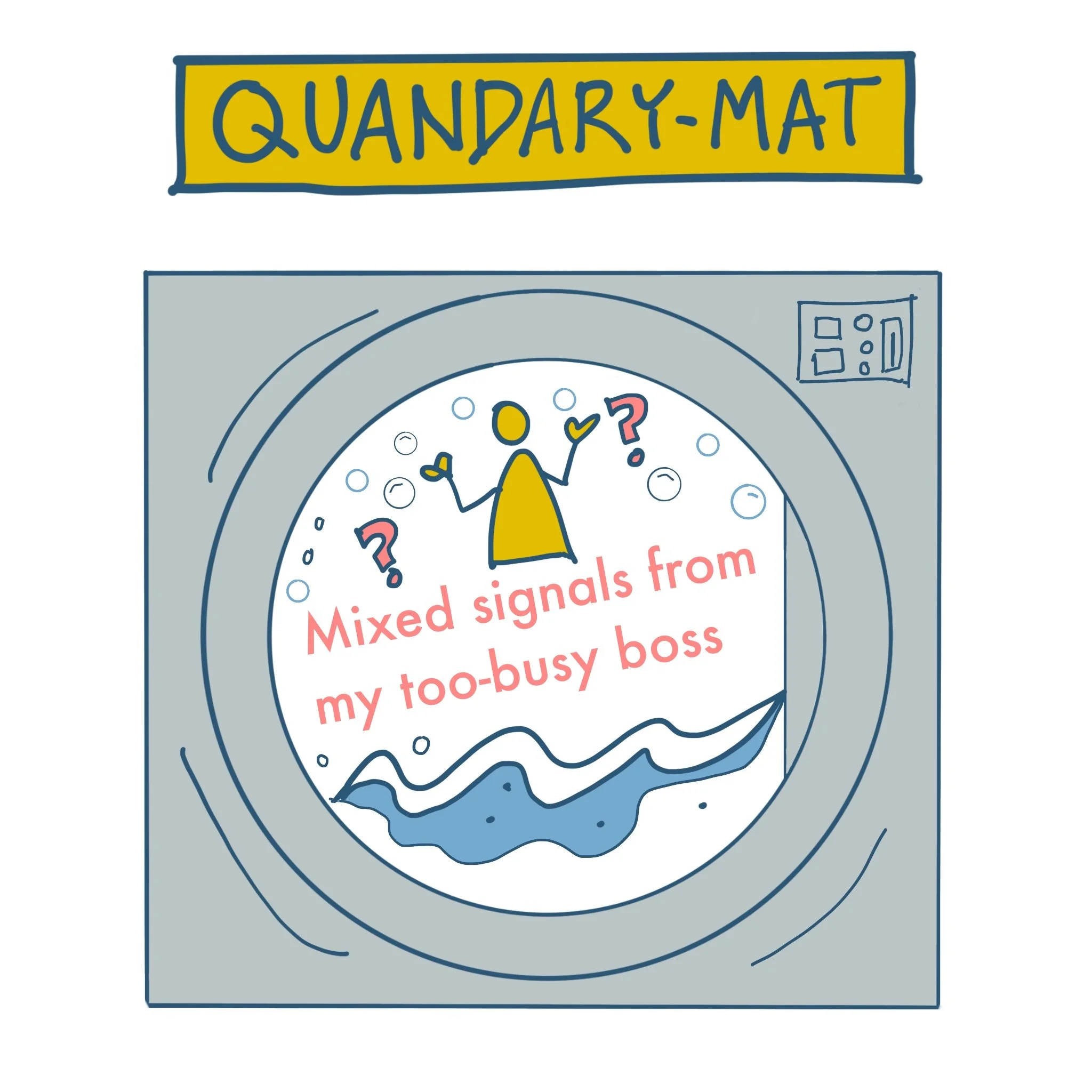Quandary-Mat: Mixed Signals from my Too-Busy Boss, Part 1
In a class session last week with 20 wonderful middle-manager leaders, I got an eyeful in a private chat message. We were discussing the importance of setting individual growth goals with team members and how to use those when delegating work.
The chat correspondent was venting to me on the side, about a related frustration with her own manager. I took her scenario and brought it into the group discussion. We kept it safe and respectful and anonymous. We have a strict rule in class: “Assume the best about people who are here with us, and those who are not.”
Her scenario provided a vivid case example for the group, and gave me the opportunity to practice a dream of mine: advice columnist!
Here is her chat to me with a written response, as the first edition of an every-so-often series: Quandary-Mat! (Get it? Like laundry-mat?) People bring in a work dilemma, and I offer ideas for how to take care of it and move ahead with crisp clean confidence.
Quandary:
I am having a hard time with my boss. Things I think I am in charge of, she does. Things I think she will do she assigns to me, usually last-minute.
I need to know what she wants from me, but it is almost impossible to get her attention. I was recently out on leave for several weeks, and we haven’t met one to one since I got back. She continues to lead my department directly, without my involvement. Today she messaged me: "We have the workgroup tomorrow. Please make sure you have an agenda ready as you are leading these meetings." How I am supposed to make an agenda when she's the one making the changes with my department, and leading these changes without my input?
Phew! This is a tough spot to be in. Your frustration radiates from your words. That feeling makes perfect sense.
There is a lot here, big picture and details, about how to work well with your boss and get the clarity that she, you, and your team need. I’m going to address this in two different articles. Here, the immediate question of what to do with this urgent and confounding request about the meeting agenda. In a second Quandary-Mat, I will address the bigger issues of your relationship with your boss following your leave, roles on specific projects and with the team you are now back to supervise yourself.
Couple things off the top, for solving quick urgent things like a meeting agenda, and for the relationship in general:
Try to be patient. It’s your boss’s job to give you time and info, so you can do your work well. And any boss usually has way too many things flying at her head every day. You know this! You are a boss, too. We rarely get enough time together, bosses and team members. We often don’t get all the info we need to do our work, when we want it.
Keep in mind two of our Culture Builders, “Be Humble and Curious” and “Create Trust and Safety.” Build trust and keep it simple by resisting assumptions that lead you to ascribe negative intent. It might be easy to think, “She doesn’t care if I look stupid in this meeting.” Try instead to assume positive things: “She wants me to succeed. She relies on me. We need time to get back in the post-leave groove.” Then you can focus on how to help her help you, instead of being stuck with those negative opinions of your boss and with no options to move forward. (This does not mean you ignore bad power dynamics or mistreatment. If that’s what’s going on, if this is a bad relationship pattern long-term, that’s another bigger problem!)
Ideas for what to do in this current Catch-22 about this one meeting agenda, or the next confounding short-term request:
Make a start. Take what you know about this workgroup and its goals and come up with the best agenda you can. This shows that you are willing to do what she asks, that you can take charge, and that you have ideas. Also, this helps her by doing some of the thinking for her. It’s often easier for a busy boss to respond to our ideas and initial plans, particularly in writing, instead of responding to a list of questions.
List your assumptions. Where you don’t have what you need and she’s not able to give it to you (doesn’t have the info, can’t make time to talk), you could include a list of assumptions that you made to come up with the agenda, like “I assume the meeting will include these 5 people. I assume we will have the data we need to make decisions.” Written assumptions are normal for drafts of bigger and more analytical work. You can practice with the short and sweet deliverable of a meeting agenda.
Share your plan for how to proceed if you don’t get the input you need. “If I don’t hear from you before the meeting, we can use the first five minutes of the meeting to make any changes to my agenda.”
There! You did your best with what you have. You can move on to other things, without waiting for your boss to do things she may not be able to do right now, or wondering if you will be judged negatively for working without everything you need.
Stay tuned! Big-picture roles sorting and relationship advice for you in the next one.
Everybody else: The Quandary-Mat is open for your quandaries. All work-relationship and team performance conundrums welcome.

